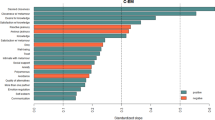Abstract
This study investigates the associations between clients’ emotional and behavioral responses to treatment termination and eight sets of indepentent variables, covering the source of termination (client, therapist, external source); the termination process (speed, centrality, control, choice, and desire), and the perceived outcome (failure, goal achievement) of the therapy. Subjects were 92 student therapists and 40 professional therapists, who reported on their clients’ perceptions, experiences, and responses. All the variables examined were associated with one or another client response. The findings support the view of treatment termination not only as a loss experience but also as a transition. They highlight the need for therapists to pay careful attention to both the source and the process of treatment termination.
Similar content being viewed by others
References
S. Anthony G. Pagano (1998) ArticleTitleThe therapeutic potential for growth during the termination process Clinical Social Work Journal 26 IssueID3 281–295 Occurrence Handle10.1023/A:1022872011238
K. Bolen (1972) ArticleTitleEasing the pain of termination for adolescents Social Casework 53 519–527
P. Boyer A. Hoffman (1993) ArticleTitleCounselor affective reactions to termination: Impact of counselor loss history and perceived client sensitivity to loss Journal of Counseling Psychology 40 271–277 Occurrence Handle10.1037//0022-0167.40.3.271
P. Bywaters (1975) ArticleTitleEnding casework relationships: The process of closure Social Work Today 6 336–338
H. Ebaugh (1988) Becoming an Ex. The process of role exit The University of Chicago Press Chicago
M. Elbow (1987) ArticleTitleThe memory book: Facilitating termination with children Social Casework 68 180–183
D. Flapan G. H. Fenchel (1987) ArticleTitleTermination Group 11 131–143 Occurrence Handle10.1007/BF01456616
A. Fortune (1987) ArticleTitleGrief only? Client and social worker reactions to termination Clinical Social Work Journal 15 IssueID2 159–171 Occurrence Handle10.1007/BF00752909
A. Fortune B. Pearlingi C. Rochelle (1992) ArticleTitleReaction to termination of individual treatment Social Work 37 IssueID2 171–178
S. Friestein (1974) ArticleTitleTermination of psychoanalysis Journal of the American Psychoanalytic Association 20 873–894
J. Garland H. Jones R. Kolodny (1973) A model for stages of development in social work groups S. Bernstein (Eds) Explorations in Group Work Milford House Boston 7–17
B. Glaser A. Strauss (1967) The discovery of grounded theory: Strategies for qualitative research Aldine Chicago
R. Gould (1977) ArticleTitleStudents’ experience with the termination phase of individual treatment Smith College Studies in Social Work 48 235–269
I. Gutheil (1993) ArticleTitleRituals and termination procedures Smith College Studies in Social Work 63 IssueID2 163–176
D. Hepworth R. Rooney J. Larsen (1997) Direct social work practice, theory and skills Books Cole Publishing Company London
H. Hess M. Hess (1984) Termination in context B. Compton and Galaway (Eds) Social work processes EditionNumber3 Homewood Dorsey IL 559–570
B. Hopson J. Adam (1976) Towards an understanding of transition: Defining some boundaries of transition dynamics J. Adams J Hayes B. Hopson (Eds) Transition—understanding and managing change Martin Robertson & Co London 3–25
A. Kramer (1986) ArticleTitleThe termination process in open-ended psychotherapy: Guidelines for clinical practice Psychotherapy 23 526–531
M. Lanyado (1999) ArticleTitleHolding and letting go: Some thoughts about the process of ending therapy Journal of Child Psychotherapy 25 IssueID3 357–378
A. Leigh (1998) Referral and termination issues for counselors Sage Publications London
H. Levinson (1977) ArticleTitleTermination of psychotherapy: Some salient issues Social Casework 58 480–489
S. Martin R. Schurtman (1985) ArticleTitleTermination anxiety as it affects the therapist Psychotherapy 22 92–96
J. Marx C. Gelso (1987) ArticleTitleTermination of individual counseling in a university counseling center Journal of Counseling Psychology 34 IssueID1 3–9 Occurrence Handle10.1037//0022-0167.34.1.3
E. Mikkelsen T. Gutheil (1979) ArticleTitleStages of forced termination: Uses of death metaphor Psychiatric Quarterly 51 IssueID1 15–27 Occurrence Handle10.1007/BF01064716 Occurrence Handle432344
H. Northen (1988) Social work with groups Columbia University Press New York
Q. Pearson (1998) ArticleTitleTermination before counseling has ended: Counseling implications and strategies for counselor relocation Journal of Mental Health Counseling 20 IssueID1 55–63
L. Penn (1990) ArticleTitleWhen the therapist must leave: Forced termination of psychodynamic therapy Professional Psychology Research and Practice 21 IssueID5 379–384 Occurrence Handle10.1037//0735-7028.21.5.379
S. Quintana W. Holahan (1992) ArticleTitleTermination in short-term counseling: Comparison of successful and unsuccessful cases Journal of Counseling Psychology 39 IssueID3 299–305 Occurrence Handle10.1037//0022-0167.39.3.299
P. Ryz J. Wilson (1999) ArticleTitleEndings as gain: The capacity to end and its role in creating space for growth Journal of Child Psychotherapy 25 IssueID3 379–403
M. Shane E. Shane (1984) ArticleTitleThe end phase of analysis: Indicators, functions and tasks of termination Journal of the American Psychoanalytic Association 32 739–772 Occurrence Handle6526965
C. Siebold (1991) ArticleTitleTermination: When the therapist leaves Clinical Social Work Journal 19 IssueID2 191–204 Occurrence Handle10.1007/BF00755046
E. Ward (1984) ArticleTitleTermination of individual counseling: Concepts and strategies Journal of Counseling and Development 63 21–25
N. Webb (1985) ArticleTitleA crisis intervention perspective on the termination process Clinical Social Work Journal 13 IssueID4 329–340 Occurrence Handle10.1007/BF00755368
Author information
Authors and Affiliations
Corresponding author
Rights and permissions
About this article
Cite this article
Baum, N. Correlates of Clients’ emotional and Behavioral Responses to Treatment Termination. Clin Soc Work J 33, 309–326 (2005). https://doi.org/10.1007/s10615-005-4946-5
Issue Date:
DOI: https://doi.org/10.1007/s10615-005-4946-5




